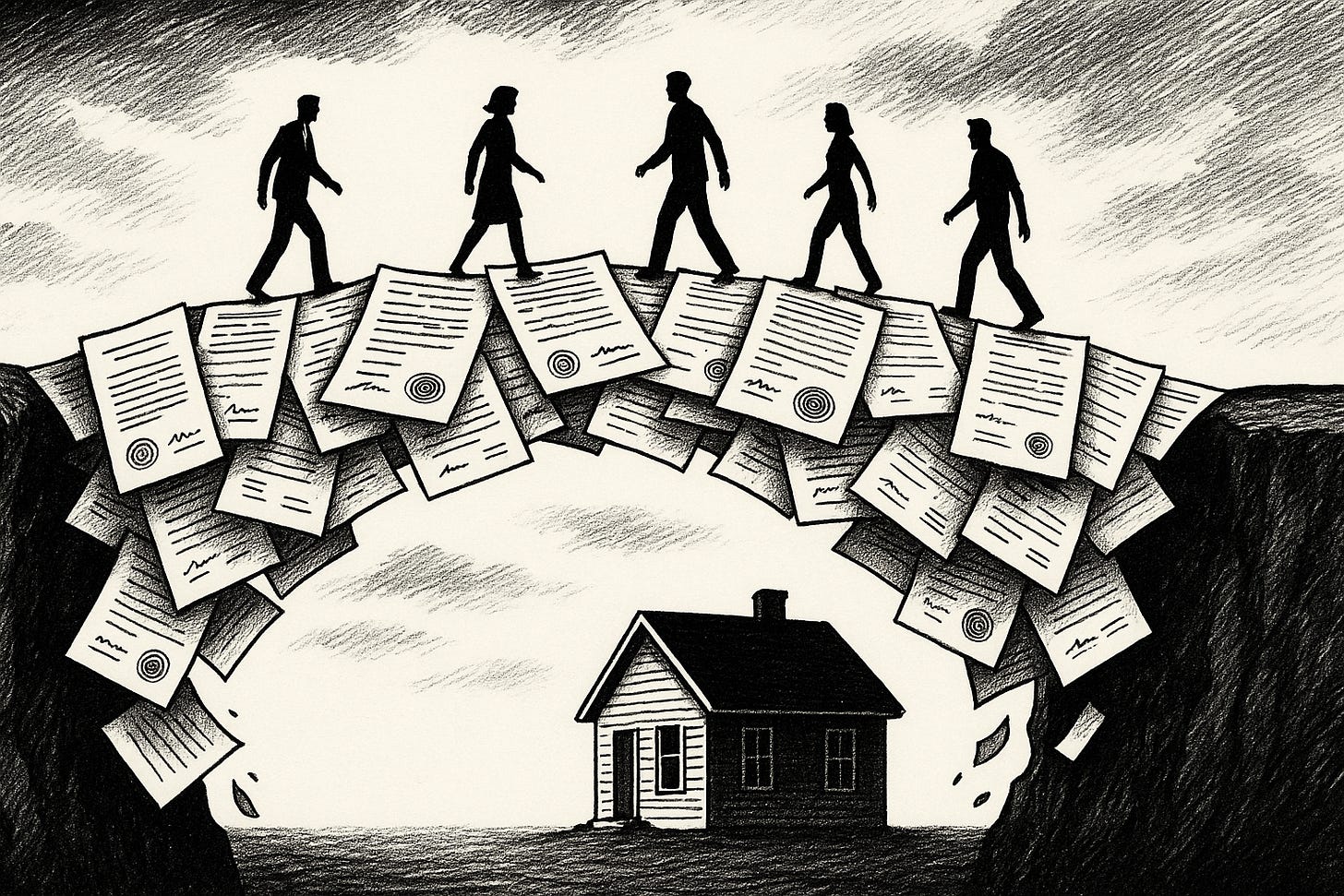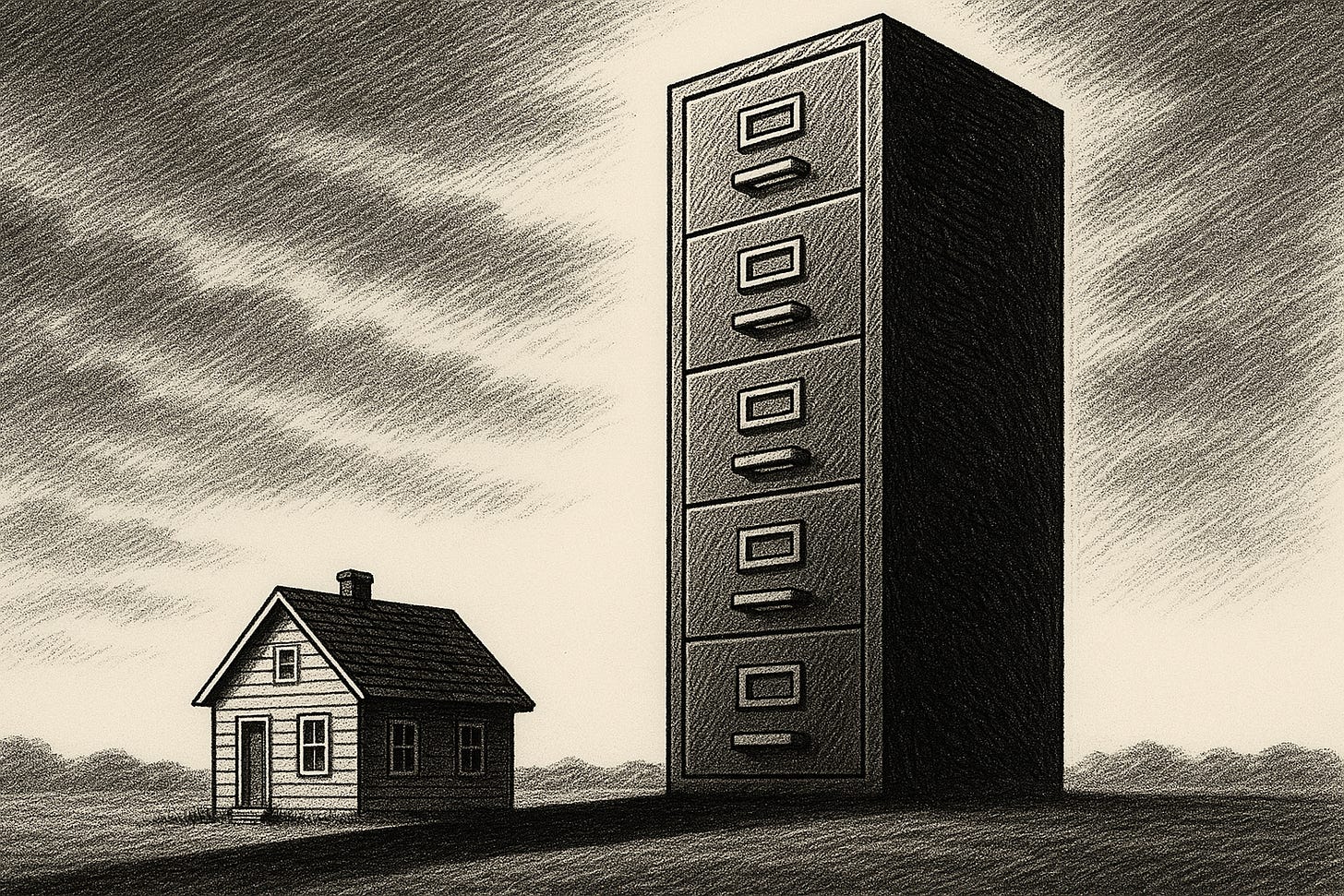Borrowed trust in a broken society
In the West, we used to live in a genuine high-trust society. No longer. Today, we're a low-trust society, masquerading as a high-trust society, fueling a booming 'trust industrial complex.'
In a high-trust society, the machinery hums quietly. People know the guardrails are intact, the institutions (mostly) work, and the people operating them, flawed as they may be, act in good faith. You don’t need to second-guess every contract, every handshake, every oral promise. You assume the wheels won’t come off.
Many people in the West still live inside that assumption. But that façade is long gone.
We no longer live in a high-trust society. Instead, we’re living in a low-trust society with trust industry scaffolding — an entire ecosystem of highly-paid intermediaries whose full-time job is to simulate the trust we no longer have in each other.
Before going any further, credit where it’s due: this line of thought belongs to Limina of The Human Responsibilities Tribunal and Riff Raft podcast. She mentioned flawed trust in an email after she got soaked for $5,000 on a real estate deal that went sour. Her conclusion was stark: whole classes of professionals (real estate agents, lawyers, title companies, home inspectors) exist today not because trust is strong, but because it has utterly collapsed, and we’re patching the void with contractors, paperwork, fees, and legally drafted repair clauses.
Once you see it, you can’t unsee it.
The realtor who stands between two people who no longer take each other’s word, working just hard enough to secure the commission.
The lawyer turning human betrayal into billable hours, stretching a 15-minute phone call into an invoice. Don’t forget the fax charges (yes, they still exist) and ubiquitous “document fees.”
The inspector issuing a certificate of safety not because the structure is or isn’t sound, but because the ritual demands documentation.
The insurance adjuster who arrives after disaster not to help you rebuild, but to determine how little their employer will have to pay.
The mediator whose very presence signals that a community can no longer bear the weight of resolving its own disputes.
In a truly high-trust culture, most interactions run on norms — shared values and clear consequences for betraying those. You don’t need a 70-page contract to buy a house from someone you grew up with. You don’t need a platoon of compliance officers to make sure employees aren’t laundering money or gaming the system in your mom-and-pop shop. You don’t need five layers of sign-offs to hire someone whose character your community can vouch for. And if you’re the one being hired, you don’t torch your reputation by acting badly, because people will remember — and that memory has weight; behaving badly isn’t just a reflection on you, it’s a reflection on your family, too.
We’ve traded human bonds for institutional girding in the name of ‘safety’ and ‘convenience.’ And like every substitution, it comes with a cost. When trust becomes something you rent rather than something you grow, the center of gravity shifts. The relationships that once held people together are replaced by nameless, faceless intermediaries who, more than any reputational or community motivation, exist to fatten themselves on the transaction.
The irony is that the more we hire brokers, gatekeepers, and credentialed middlemen, the less we trust. The bigger the trust industry grows, the more brittle the society beneath it becomes. And when the notaries and lawyers and inspectors and regulators prove to be no more reliable than the people they were supposed to replace, societies rarely return to organic trust.
They turn to surveillance instead.
You can already feel the pivot: digital IDs to prove who you are. Biometrics to prove you belong. Social scoring to prove you deserve access. Programmable money to prove your intentions are pure. Everything verified, everything logged, everything tracked — not because trust has been rebuilt, but because its absence has become intolerable.
Low-trust societies don’t drift gently into collapse. They lurch toward total control, mistaking monitoring for safety, renaming restriction as ‘responsibility,’ building a panopticon and calling it public service.
What Limina grasped — and what so many miss — is that we’ve forgotten what real trust even feels like. We’ve lived so long with synthetic trust that the original has become almost unimaginable. Worse, a sizable portion of society doesn’t even realize the rupture happened. Or they do, but their own mortgage and car payments require just the right amount of ‘blind eye’ to get through the day.
The trust industry is a monument to what we’ve lost — and like all monuments, it is both a tribute and a warning. A tribute to something gone that perhaps we should have preserved, and a warning that the more we rely on figureheads instead of one another, the faster what little trust exists begins to fade.
In our age of convenience, there’s an app for everything — except the glue that actually holds a society together. Real trust comes from time spent in the real world, with real people, really talking, laughing, forgiving, sharing, carrying a little weight for each other. It’s slow, it’s human, it’s sometimes messy and even a bit inconvenient.
We should all get back to trying it sometime, ‘cause it sure beats a ‘thumbs up’ on Facebook.




My trust of systems is gone. My trust of leaders is gone. My belief that people will wake up, and we can stop global totalitarian control is on very shaky ground. I'm left with just myself and a couple close relationships.
.... and the TRUST complex isn't really trust worthy is it?
No one actually thinks that insurance is going to pay out, that the inspector is going to be responsible if he/she misses something. We pay for imcompetence and/or duty (through legislation)
I've also wondered if people who believe in the trust complex, become less trustworthy, because they feel like they've paid for the trust that they no longer have to personally encompass this virtue. Somehow their payment has allowed them to morally castrate themselves; everyone wants to get something for what they paid for?
Thoughts?
And thanks Zahra and Stephen for the kind credit.